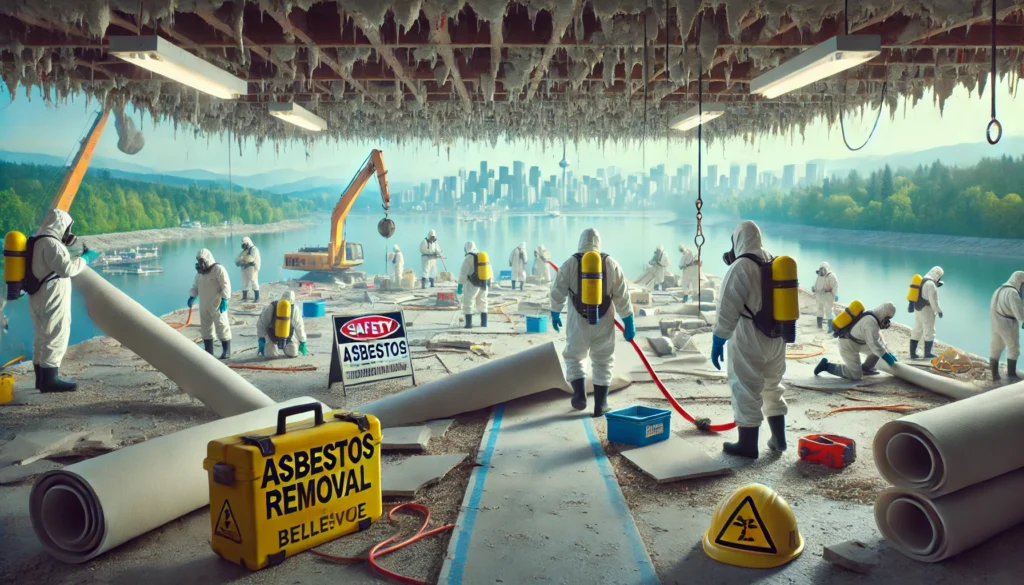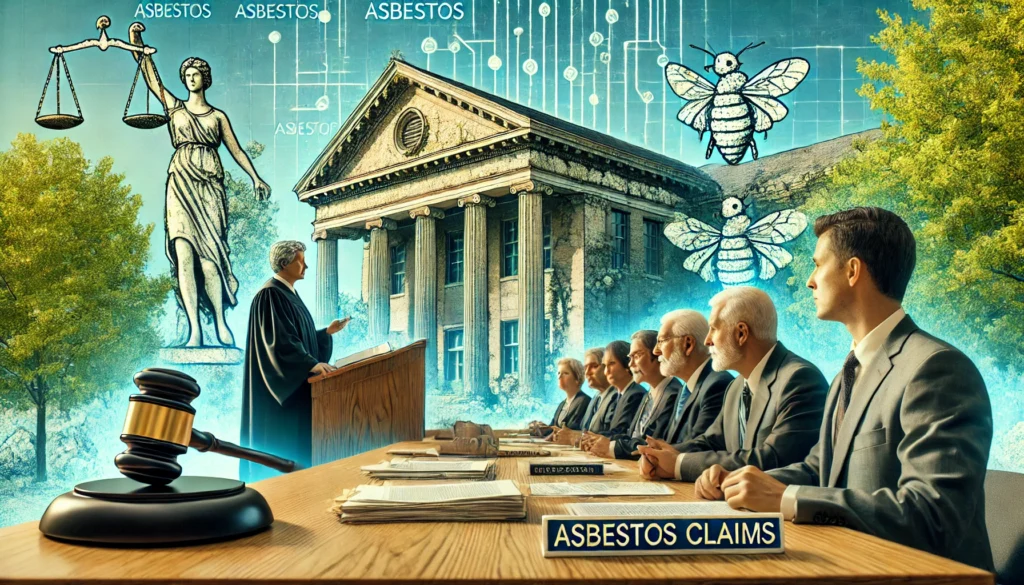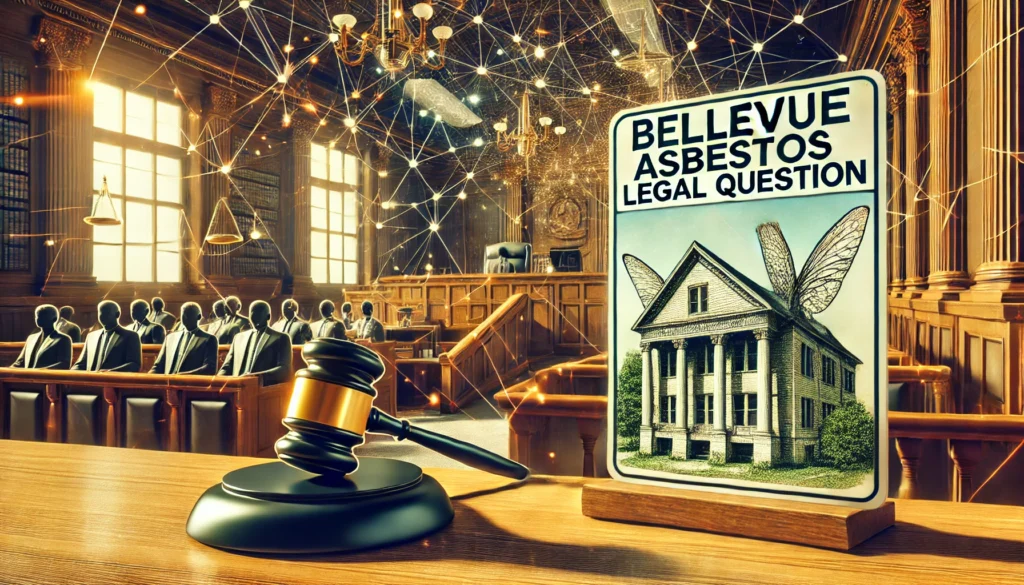Asbestos, a material that was widely used for its heat resistance and durability in construction and manufacturing, is now recognized as a serious health hazard. Exposure to asbestos fibers can cause a variety of diseases, including lung cancer, asbestosis, and mesothelioma, a rare cancer linked to asbestos. These illnesses often take years, sometimes decades, to develop, making the Bellevue asbestos legal question a significant issue due to the city’s history and ongoing concerns about exposure.
If you or someone you know has been exposed to asbestos or is concerned about potential exposure, understanding the legal framework surrounding the Bellevue asbestos legal question is essential. This guide provides a clear overview of the key legal aspects, including regulations, liability, legal rights, and compensation options.
Understanding the Bellevue Asbestos Legal Question: Your Rights and Options
The Bellevue asbestos legal question centers on the rights and protections available to individuals affected by asbestos exposure. Asbestos, once widely used in construction and manufacturing, poses severe health risks such as mesothelioma, lung cancer, and asbestosis. In Bellevue, residents and workers may still encounter asbestos in older buildings, workplaces, or improperly managed materials.
Legal frameworks exist to protect people from asbestos exposure and help those diagnosed with related
illnesses seek justice. In Bellevue, these laws encompass federal regulations like the Asbestos Hazard Emergency Response Act (AHERA) and state-level rules outlined in the Washington Administrative Code (WAC) Chapter 296-65. These regulations ensure proper handling, removal, and disposal of asbestos to prevent exposure.
Victims of asbestos-related diseases have legal rights to seek compensation for medical expenses, lost wages, and other damages. Options include personal injury lawsuits, claims against asbestos trust funds, and workers’ compensation. Bellevue residents must also be aware of the three-year statute of limitations in Washington for filing asbestos-related legal claims, starting from the date of diagnosis or death.
If you’ve been exposed to asbestos, it’s crucial to seek medical attention, document your exposure, and consult with an experienced attorney specializing in asbestos cases. This proactive approach can help you navigate the legal process and secure the care and compensation you deserve.
Asbestos Laws and Regulations in Bellevue
Asbestos laws are designed to protect people from the harmful effects of exposure, particularly in environments like workplaces, schools, and homes. In Bellevue, these laws are a combination of federal, state, and local regulations.
Federal Regulations
The Asbestos Hazard Emergency Response Act (AHERA) requires inspections of schools and public buildings for asbestos, with management plans to address any asbestos found.
The National Emission Standards for Hazardous Air Pollutants (NESHAP) regulates the demolition or renovation of buildings containing asbestos, ensuring that hazardous air pollutants are controlled during such activities.
State Regulations (Washington State):
Washington State enforces regulations under the Washington Administrative Code (WAC) Chapter 296-65, which requires asbestos-handling professionals to be certified and follow specific procedures when working with asbestos-containing materials.
Contractors and abatement companies in Bellevue must be licensed to ensure that they meet safety standards and avoid exposure risks during asbestos removal and disposal.
Local Regulations
Bellevue has additional local ordinances that align with state laws and ensure that asbestos removal is handled safely. Property owners, contractors, and other stakeholders must comply with these regulations to avoid penalties.
Liability and Legal Rights
If you or a loved one has been diagnosed with an asbestos-related disease, you may be entitled to legal action. Understanding who is responsible for the exposure and the legal rights you have is essential.
Liability for Asbestos Exposure
In many cases, those responsible for asbestos exposure can be held liable. Employers who failed to protect workers, manufacturers who sold asbestos-containing materials, and property owners who neglected to manage asbestos risks are among those who can be held accountable.
Workplace Liability
If someone is exposed to asbestos at work, they may be able to file a workers’ compensation claim or a personal injury lawsuit. Employers are required to provide a safe working environment, and failure to do so can result in legal consequences.
Tenant and Landlord Issues
Landlords in Bellevue must inform tenants if there is asbestos present in a rental property. They are also responsible for making sure that the asbestos is removed by certified professionals to prevent exposure.
Manufacturer Liability
Companies that produced asbestos products are often held responsible for the health consequences of their materials. Many of these companies have set up trust funds to compensate individuals who developed diseases as a result of exposure.
Legal Remedies and Compensation Options
If you or a family member has been diagnosed with an asbestos-related disease, there are several ways to pursue compensation for medical expenses, lost wages, and pain and suffering.
Personal Injury Lawsuits
Individuals diagnosed with an asbestos-related illness can file a personal injury lawsuit against the responsible parties. This lawsuit can help recover medical costs, lost income, and compensation for pain and suffering.
Wrongful Death Claims
If someone dies from an asbestos-related disease, their family members may file a wrongful death claim to seek damages for their loss. This can help cover funeral expenses, lost future earnings, and emotional distress caused by the death.
Asbestos Trust Funds
Many companies that used asbestos in their products have filed for bankruptcy but established asbestos trust funds to compensate victims. These funds allow individuals to file claims and receive compensation without going through lengthy lawsuits.
Workers’ Compensation
If asbestos exposure occurred at work, individuals may be eligible for workers’ compensation, which covers medical expenses, rehabilitation, and lost wages.
Statute of Limitations
- Time is of the essence when pursuing legal action related to asbestos exposure. In Washington State, there are strict time limits for filing a claim:
Personal Injury Claims
- Victims of asbestos-related diseases have three years from the date of diagnosis to file a personal injury lawsuit. This period can be crucial in determining whether you can pursue legal compensation.
Wrongful Death Claims
- Family members of someone who passed away due to asbestos exposure have three years from the date of death to file a wrongful death lawsuit.
- It is essential to act quickly and consult with an attorney as soon as possible to ensure that you meet the statute of limitations for your claim.
Steps to Take if Exposed to Asbestos
If you believe you have been exposed to asbestos, follow these steps:
Seek Medical Attention
- Consult a doctor who specializes in asbestos-related diseases to get a diagnosis and begin treatment as early as possible.
Contact a Lawyer
- Get in touch with an attorney who specializes in asbestos cases. They can guide you through the process of filing a claim and ensure that your legal rights are protected.
Document Your Exposure
- Keep detailed records of your exposure, including where and when it occurred, as well as any medical treatments you’ve received. This will help support your claim if you pursue legal action.
Preventing Asbestos Exposure in Bellevue
Prevention is key when it comes to protecting people from asbestos-related diseases. Some ways to reduce the risk include:
Public Awareness
- Educating residents, workers, and property owners about the dangers of asbestos and how to avoid exposure is essential for public health.
Certified Asbestos Removal
- If you suspect asbestos in your home or workplace, hire a certified professional to inspect and safely remove it. Only certified contractors should handle asbestos to minimize risks.
Compliance with Regulations
- Ensure that all work involving asbestos follows state and federal regulations to keep exposure levels as low as possible.
Resources and Support
If you or someone you know has been affected by asbestos, there are resources available to help:
Legal Assistance
Find an attorney who specializes in asbestos litigation in Bellevue. These professionals can help you navigate the legal process and fight for the compensation you deserve.
Medical Support
Contact healthcare providers in Bellevue who specialize in asbestos-related diseases. Early detection and treatment can significantly improve health outcomes.
Government Agencies
For more information on asbestos safety, contact federal agencies like the EPA or OSHA, or the Washington State Department of Labor and Industries.
Conclusion
Asbestos exposure remains a serious issue with potentially long-lasting health consequences. Addressing the Bellevue asbestos legal question requires a clear understanding of your rights and options. Legal protections are available in Bellevue for those exposed to asbestos, and taking action promptly can make a significant difference. If you believe you’ve been exposed, prioritize seeking medical attention, thoroughly document your exposure history, and consult with an experienced attorney to explore compensation opportunities. With the right guidance and support, victims can access the care and financial resources they need to rebuild their lives.
FAQs
What should I do if I find asbestos in my home?
Hire a certified asbestos removal professional immediately and avoid disturbing the material to prevent airborne fibers.
Can I sue my employer for asbestos exposure at work?
Yes, if your employer failed to follow safety standards, you can file a personal injury claim or seek workers’ compensation.
How long do I have to file an asbestos-related lawsuit in Washington?
You have three years from the date of diagnosis or death to file a personal injury or wrongful death claim.
Are landlords responsible for asbestos in rental properties?
Yes, landlords must disclose asbestos risks and ensure it is safely managed or removed by certified professionals.
What compensation options are available for asbestos victims?
Options include personal injury lawsuits, wrongful death claims, asbestos trust funds, and workers’ compensation benefits.
Article Recommendations
Port St. Lucie Mesothelioma Lawyer Vimeo: A Victim\u2019s Guide to Finding Legal Help and Resources




